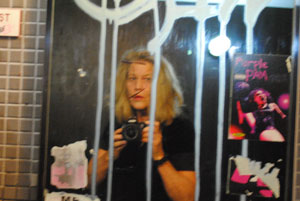Star Black

Star Black is a poet, photographer, and collage artist living and working in New York City. She’s released five books of poems, has taught at The New School and Stony Brook University, and lectured at the Bennington Writing Seminars. An exhibit featuring her collages in hand-made books will be shown from January 20 through April 3 at the Center for Book Arts.
The Morning News: What can visitors to the exhibition expect?
Star Black: The Center for Book Arts always has a sense of decorative overload to its openings because the art of the book is displayed amidst the shop tools of book-making. Nipping presses, paper cutters, letterpress machines, large flat work tables, and dog-eared wooden files of all kinds are never far away. The books shown—in my case three 19-inch-high visual accordion books containing original collages and poems—seem to have evolved out of the setting: a large floor-through book-making studio on the third floor of an industrial building on West 27th Street.
TMN: What are you working on next?
SB: A book of poems. I’m in the thicket of several thickets.
TMN: What’s been your favorite part of working as a photographer in New York?
SB: By far and away, the people who hire me and the people I photograph, and, when I’m out walking, the people on the street. Photography relaxes me because it simplifies my mental life. I have none when I’m photographing. I’m free, I’m focused. In some ways, it is not unlike meditation. The world appears beautifully and quietly.
TMN: What’s something you’re not good at but wish you were?
SB: Entertaining. I’d like to have my friends over more often.
TMN: When you teach, what’s the most common mistake you see poetry students make?
SB: They do not believe in themselves enough. They don’t realize they are as good at writing as I am, but haven’t yet spent the time reading poetry and writing poetry until they do realize that they have enough of a command of the material already written to allow them to stand among others as writers. They want to be “made” better by a teacher when the teacher knows they are already “made” and the challenge is to inspire them to teach themselves, to improve their work by recognizing that there are no short-cuts—that Catullus is as good as e. e. cummings, that Byron’s Don Juan needs to be read until one can see how great it is, that Shakespeare’s sonnets are still untouchable unless you love one or two by Sir Thomas Wyatt just as much. The great thing about Bob Dylan’s Chronicles, Volume One is to see how hungry he was to learn, to read, to absorb what’s out there.
TMN: Who is your favorite contemporary poet and why?
SB: I read and reread John Ashbery, not because I understand everything in his poems, but because his poems slow me down and keep my attention directed to the “poemscape,” if there is such a thing. And there’s just enough mastery continuously evident—a strange word, an off-beat image, an astonishing sentence, a twist on a familiar phrase, an obscure allusion, a loving thought, a humorous aside—to keep me going in befuddled wonderment or to keep me intrigued, either way.
I can take one of his books off the shelf at random, And The Stars Were Shining, published in 1994, flip to a poem, “Mutt and Jeff,” and find that I have underlined these lines:
and:
TMN: What’s your favorite object in your workspace?
SB: When I’m writing I keep a small Buddhist votive tablet from Thailand and a small trinket from India that has an embossed image of Ganesha next to the desk lamp. While preparing this show, I’ve kept a collage I made in 2004 on the mantel.
TMN: Where do you go to hear poetry in New York?
SB: Recently, I went to the KGB Bar on East 4th Street to hear Mark Bibbons read with Anne Carson and Mary Jo Bang. Last week I went to The Poetry Project at St. Mark’s Church to hear Stephen Motika, John Yau, Elaine Equi, Marjorie Welish, Alan Gilbert, Bill Mohr, Douglas A. Martin, and Pierre Joris read from Tiresias: The Collected Poems of Leland Hickman. Hickman edited the poetry journal Temblor, which ran for 10 issues in the 1980s; he died in l99l. The Poetry Project played a tape of Hickman reading one of his own poems at the end of the tribute, which was wonderful.
TMN: Is that your pen name, or are you just that cool?
SB: When she was in high school, my mother had a close friend known as Starr Hoover. He went on to graduate from the Virginia Military Institute and died fighting in World War II. She decided to name her first child in his memory—Starr if she had a boy and Star if she had a girl.
